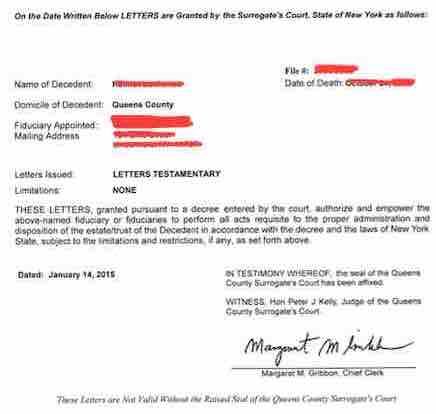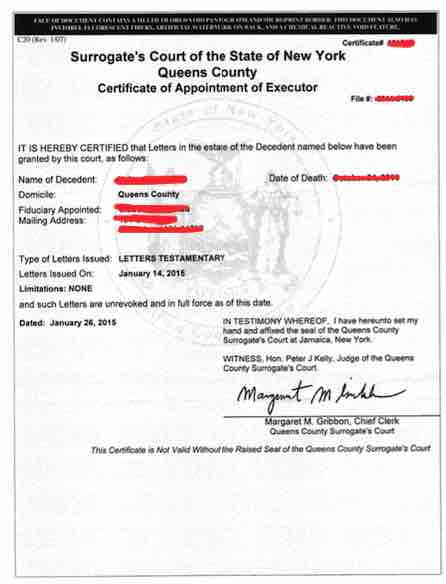What is a Letter of Testamentary
A letter testamentary an official document issued by the New York Surrogate’s Court that permits a person to act on behalf of an estate of a person who died with a will. A person who is nominated by a will to be an executor of an estate does not have the power or authority to act on behalf of an estate until they apply for, and are issued, letter of testamentary by the Surrogate’s Court.
The document is actually called Letters of Testamentary, and it’s not a letter – it’s a court order. The confusion stems from the fact that Order used to be called Letter hundreds of years ago.
Here is a redacted picture of a letter of testamentary obtained by our law firm:
What is a Letter of Testamentary? It authorizes a person to act as a representative of an estate. They allow a person to perform the responsibilities of an estate. Here are some of the things a person can do once they are appointed as an administrator of an estate by letter of testamentary issued by the Surrogate’s Court:
- Obtain a tax id number for an estate from the federal government
- Open an estate bank account
- Request information from banks and other institutions that control the decedent’s assets. The banks will comply if you show them the letter of testamentary and the death certificate
- Transfer assets from the decedent’s name to the name of the estate
- Pay debts of the decedent
- Collect claims of the decedent
- Marshal assets of the estate
- Distribute the estate assets to the beneficiaries of the estate, after obtaining proper waivers or providing an accounting
Those things would be impossible to do without a letter of testamentary. The banks will not give you information and will not transfer the assets, the county recorder will not record property deeds, and a buyer will not buy a property from you.
You often need more than one, since each bank and government agency would require an original. Also, some institutions require a more official-looking document. This is why the court can also issue a Certificate of Appointment of Executor, which is printed on a watermarked blue and red paper and looks similar to a death certificate, birth certificate or marriage certificate.
Here is a redacted picture of a Certificate of Appointment of Executor obtained by our law firm:

What is a Letter of Testamentary and Where to Get It
In order to get a letter of testamentary, one would have to apply to the Surrogate’s Court of the county where the person who died resided. You would need your estate attorney help you get the documents together, such as the petition for probate, the original last will and testament of the decedent, the original death certificate, a copy if the funeral bill, as well as other documents such as waivers, citation, proposed order, affidavit of heirship, family tree, due diligence, etc., and appear in court on your behalf.
Even if the decedent died in a different state, and you have a letter of testamentary from that state, you will still need to obtain a separate letter of testamentary by verifying the out-of-state letter of testamentary through an ancillary probate proceeding.
letter of testamentary is issued when a person died with a will, to a person who applies and is appointed by the court as the administrator of a deceased person’s estate. A person can only be an executor of an estate if they are nominated by the will of the person who died and is otherwise qualified – are over the age of 18 and are not a convicted felon.
How Long Does it Take to Get Letter of Testamentary
It typically takes a few months to get a letter of testamentary. If the probate is contested, i.e. if someone is challenging the will, then getting a letter of testamentary can take years, or they can be potentially denied altogether. Although getting the letters is only one of the steps of the probate process, it is the most important step.
If the person who died did not leave a will, the document will be similar and with similar powers, but it will be called “Letters of Administration,” and the Certificate will be called “Certificate of the Appointment of Administrator.”
If you are asking what is a Letter of Testamentary, you may need assistance from an attorney. You can call me, Albert Goodwin, Esq., New York estate, guardianship, wills, trust, medicaid and probate lawyer, at (212) 233-1233 or 212-233-1233.













